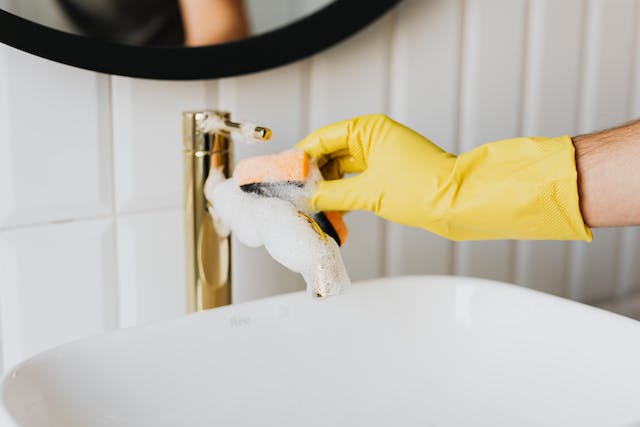Who would’ve thought that living in the first world would mean having to deal with water problems? Out of all the possible things, hard water is one of the most common issues Americans face throughout the entire country.
But as small as this problem might seem, it can cause a ton of unwanted damage to appliances, prevent soap from lathering properly, cause limescale deposits on fixtures, tiles, and more, plus a myriad of issues with inflated water and electricity bills.
How to Fix Existing Hard Water Stains
If you want to prevent hard water problems in the future, you have to resolve existing issues caused by it right now. So let’s start with the most noticeable hard water spots of them all, mainly the ones on showerheads and faucets. It’s time to give your faucet and showerhead that “new shine” that they used to have before.
Get a clean rag or microfiber cloth, soak it in white vinegar, and then wrap the faucet or showerhead with it. Make sure that all of the affected surface comes in direct contact with the rag and especially the vinegar. Then just let the rag sit on the affected surface for at least 30 minutes, but preferably a full hour or even more.
Once you’re done with this, remove the rag and then use a non-scratch sponge or a soft clean cloth to scrub the faucet or showerhead if necessary. You can do this multiple times until all of the residue is gone.
The Rest of the Bathroom
Removing hard water stains from the rest of the bathroom is relatively similar to the method we already mentioned above. If you want to remove hard water stains from a toilet, a porcelain sink, an enameled tub, or ceramic shower tile, you can use a solution made out of 50% white vinegar and 50% borax.
Apply the said solution on the affected surfaces, let it sit for at least one hour, then scrub with the most effective sponge, pad, or scrub brush that won’t scratch the finish. You can even use ultra-fine sandpaper or 0000 steel wool on most toilets, enameled tubs, and tile.
How to Prevent Hard Water Spots
The most effective way to prevent hard water stains is to use either a water softener, water descaler, or reverse osmosis system.
To be fair, while these systems effectively prevent hard water spots, they do cost some money, and not all people may be able to afford the price upfront. Fortunately, there are also other ways to make sure you won’t be dealing with limescale any time soon.
For example, if you want to prevent hard water stains on your dishes, consider getting some hard water dishwasher detergent instead of regular one. You can also add some rinse aid agent just to be sure. For your washing machine, use a liquid water softener along with the detergent. And to keep your house from having issues with limescale, just clean on a regular basis with solutions made specifically for hard water.
Final Thoughts
Have you tried any of the tips found in this article? Leave us a comment down below and share your thoughts with us about preventing hard water spots and other household DIY tricks.

